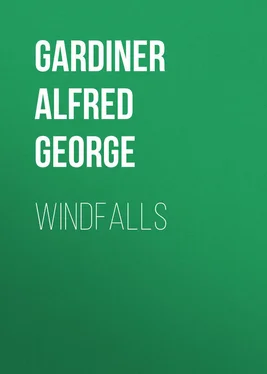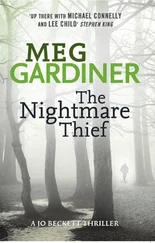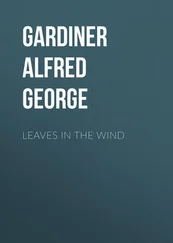Alfred Gardiner - Windfalls
Здесь есть возможность читать онлайн «Alfred Gardiner - Windfalls» — ознакомительный отрывок электронной книги совершенно бесплатно, а после прочтения отрывка купить полную версию. В некоторых случаях можно слушать аудио, скачать через торрент в формате fb2 и присутствует краткое содержание. Жанр: foreign_antique, foreign_prose, на английском языке. Описание произведения, (предисловие) а так же отзывы посетителей доступны на портале библиотеки ЛибКат.
- Название:Windfalls
- Автор:
- Жанр:
- Год:неизвестен
- ISBN:нет данных
- Рейтинг книги:3 / 5. Голосов: 1
-
Избранное:Добавить в избранное
- Отзывы:
-
Ваша оценка:
- 60
- 1
- 2
- 3
- 4
- 5
Windfalls: краткое содержание, описание и аннотация
Предлагаем к чтению аннотацию, описание, краткое содержание или предисловие (зависит от того, что написал сам автор книги «Windfalls»). Если вы не нашли необходимую информацию о книге — напишите в комментариях, мы постараемся отыскать её.
Windfalls — читать онлайн ознакомительный отрывок
Ниже представлен текст книги, разбитый по страницам. Система сохранения места последней прочитанной страницы, позволяет с удобством читать онлайн бесплатно книгу «Windfalls», без необходимости каждый раз заново искать на чём Вы остановились. Поставьте закладку, и сможете в любой момент перейти на страницу, на которой закончили чтение.
Интервал:
Закладка:
It was rather a shabby trick of young Scott’s, and all one can say in regard to its unhappy consequences is that a boy so delicately balanced and so permanently undermined by a trifle would in any case have come. to grief in this rough world. There is no harm in cultivating habits, so long as they are not injurious habits. Indeed, most of us are little more than bundles of habits neatly done up in coat and trousers. Take away our habits and the residuum would hardly be worth bothering about. We could not get on without them. They simplify the mechanism of life. They enable us to do a multitude of things automatically which, if we had to give fresh and original thought to them each time, would make existence an impossible confusion. The more we can regularise our commonplace activities by habit, the smoother our path and the more leisure we command. To take a simple case. I belong to a club, large but not so large as to necessitate attendants in the cloakroom. You hang up your own hat and coat and take them down when you want them. For a long time it was my practice to hang them anywhere where there was a vacant hook and to take no note of the place. When I sought them I found it absurdly difficult to find them in the midst of so many similar hats and coats. Memory did not help me, for memory refused to burden itself with such trumpery things, and so daily after lunch I might be seen wandering forlornly and vacuously between the rows and rows of clothes in search of my own garments murmuring, “Where did I put my hat?” Then one day a brilliant inspiration seized me. I would always hang my coat and hat on a certain peg, or if that were occupied, on the vacant peg nearest to it. It needed a few days to form the habit, but once formed it worked like a charm. I can find my hat and coat without thinking about finding them. I go to them as unerringly as a bird to its nest, or an arrow to its mark. It is one of the unequivocal triumphs of my life.
But habits should be a stick that we use, not a crutch to lean on. We ought to make them for our convenience or enjoyment and occasionally break them to assert our independence. We ought to be able to employ them, without being discomposed when we cannot employ them. I once saw Mr Balfour so discomposed, like Scott’s school rival, by a trivial breach of habit. Dressed, I think, in the uniform of an Elder Brother of Trinity House he was proposing a toast at a dinner at the Mansion House. It is his custom in speaking to hold the lapels of his coat. It is the most comfortable habit in speaking, unless you want to fling your arms about in a rhetorical fashion. It keeps your hands out of mischief and the body in repose. But the uniform Mr Balfour was wearing had no lapels, and when the hands went up in search of them they wandered about pathetically like a couple of children who had lost their parents on Blackpool sands. They fingered the buttons in nervous distraction, clung to each other in a visible access of grief, broke asunder and resumed the search for the lost lapels, travelled behind his back, fumbled with the glasses on the table, sought again for the lapels, did everything but take refuge in the pockets of the trousers. It was a characteristic omission. Mr Balfour is too practised a speaker to come to disaster as the boy in Scott’s story did; but his discomfiture was apparent. He struggled manfully through his speech, but all the time it was obvious that he was at a loss what to do with his hands, having no lapels on which to hang them.
I happily had a remedy for my disquietude. I put up my pen, took out a pencil, and, launched once more into the comfortable rut of habit, ticked away peacefully like the eight-day clock. And this is the (I hope) pardonable result.
IN DEFENCE OF WASPS
It is time, I think, that some one said a good word for the wasp. He is no saint, but he is being abused beyond his deserts. He has been unusually prolific this summer, and agitated correspondents have been busy writing to the newspapers to explain how you may fight him and how by holding your breath you may miraculously prevent him stinging you. Now the point about the wasp is that he doesn’t want to sting you. He is, in spite of his military uniform and his formidable weapon, not a bad fellow, and if you leave him alone he will leave you alone. He is a nuisance of course. He likes jam and honey; but then I am bound to confess that I like jam and honey too, and I daresay those correspondents who denounce him so bitterly like jam and honey. We shouldn’t like to be sent to the scaffold because we like jam and honey. But let him have a reasonable helping from the pot or the plate, and he is as civil as anybody. He has his moral delinquencies no doubt. He is an habitual drunkard. He reels away, in a ludicrously helpless condition from a debauch of honey and he shares man’s weakness for beer. In the language of America, he is a “wet.” He cannot resist beer, and having rather a weak head for liquor he gets most disgracefully tight and staggers about quite unable to fly and doubtless declaring that he won’t go home till morning. I suspect that his favourite author is Mr Belloc – not because he writes so wisely about the war, nor so waspishly about Puritans, but because he writes so boisterously about beer.
This weakness for beer is one of the causes of his undoing. An empty beer bottle will attract him in hosts, and once inside he never gets out. He is indeed the easiest creature to deal with that flies on wings. He is excessively stupid and unsuspicious. A fly will trust nobody and nothing, and has a vision that takes in the whole circumference of things; but a wasp will walk into any trap, like the country bumpkin that he is, and will never have the sense to walk out the way he went in. And on your plate he simply waits for you to squeeze his thorax. You can descend on him as leisurely as you like. He seems to have no sight for anything above him, and no sense of looking upward.
His intelligence, in spite of the mathematical genius with which he fashions his cells, is contemptible, and Fabre, who kept a colony under glass, tells us that he cannot associate entrance and exit. If his familiar exit is cut off, it does not occur to him that he can go out by the way he always comes in. A very stupid fellow.
If you compare his morals with those of the honey bee, of course, he cuts a poor figure. The bee never goes on the spree. It avoids beer like poison, and keeps decorously outside the house. It doesn’t waste its time in riotous living, but goes on ceaselessly working day and night during its six brief weeks of life, laying up honey for the winter and for future generations to enjoy. But the rascally fellow in the yellow stripes just lives for the hour. No thought of the morrow for him, thank you. Let us eat, drink, and be merry, he says, for to-morrow – . He runs through his little fortune of life at top speed, has a roaring time in August, and has vanished from the scene by late September, leaving only the queen behind in some snug retreat to raise a new family of 20,000 or so next summer.
But I repeat that he is inoffensive if you let him alone. Of course, if you hit him he will hit back, and if you attack his nest he will defend it. But he will not go for you unprovoked as a bee sometimes will. Yet he could afford this luxury of unprovoked warfare much better than the bee, for, unlike the bee, he does not die when he stings. I feel competent to speak of the relative dispositions of wasps and bees, for I’ve been living in the midst of them. There are fifteen hives in the orchard, with an estimated population of a quarter of a million bees and tens of thousands of wasps about the cottage. I find that I am never deliberately attacked by a wasp, but when a bee begins circling around me I flee for shelter. There’s nothing else to do. For, unlike the wasp, the bee’s hatred is personal. It dislikes you as an individual for some obscure reason, and is always ready to die for the satisfaction of its anger. And it dies very profusely. The expert, who has been taking sections from the hives, showed me her hat just now. It had nineteen stings in it, planted in as neatly as thorns in a bicycle tyre.
Читать дальшеИнтервал:
Закладка:
Похожие книги на «Windfalls»
Представляем Вашему вниманию похожие книги на «Windfalls» списком для выбора. Мы отобрали схожую по названию и смыслу литературу в надежде предоставить читателям больше вариантов отыскать новые, интересные, ещё непрочитанные произведения.
Обсуждение, отзывы о книге «Windfalls» и просто собственные мнения читателей. Оставьте ваши комментарии, напишите, что Вы думаете о произведении, его смысле или главных героях. Укажите что конкретно понравилось, а что нет, и почему Вы так считаете.












